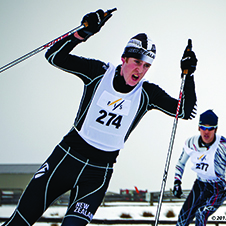
Please note: no new enrolments for the major in Sports Technology will be accepted. Sports Technology is available as a minor subject for a range of degrees.
Current students majoring in Sports Technology
For course advising or concerns please contact
Peter Lamb
Email peter.lamb@otago.ac.nz
Tel +64 3 479 9115
Student contacts
- Orla Scanlon (SPEX rep). Email scaor427@student.otago.ac.nz
- Megan Foley (PE Māori Association rep). Email folme454@student.otago.ac.nz
Delivering the cutting edge in sports performance
How does technology enhance sporting performance? With advanced analysis tools, hi-tech sportswear, innovative design in training equipment and programmes, and leading research into human physiology. How does sports technology enhance New Zealand's economy?
By developing new technologies and products to export, and engaging with local and international business. How does sports technology extend knowledge? Innovative technologies enhance research, allowing us to better understand the capabilities of the human body. How can you be a part of all of this? By studying Sports Technology at the University of Otago.
Study at New Zealand's top-ranked department
This subject is hosted at the School of Physical Education, Sport and Exercise Sciences. We are the number 1 ranked department in New Zealand and 12th in the world in our field.
Why study sports technology?
Our top sports organisations recognise the importance of technology in ensuring New Zealand's competitiveness in sport and have indicated their support. There are many benefits:
- The development of new ideas, including products and technology-based services, by staff and students
- Engagement with entrepreneurs and businesses
- Collaboration with key partners locally and internationally
You will develop a range of practical skills, and scientific and technical knowledge that is suited to the diverse employment opportunities that exist in this exciting area of development.
What is Sports Technology?
Sports Technology is part of the Applied Science programme. It is an incredibly diverse, interdisciplinary field that can lead to research in fields such as the modelling of movement, sports performance analysis, athlete workload monitoring, brain-blood flow neurophysiology, and the broadcasting of sporting events (e.g. 3D animation, computational modelling). Teaching and research in technologies associated with sport already occur in a number of disciplines including:
- Applied Science
- Computer Science
- Medicine
- Human Nutrition
- Physical Education
- Physics
- Physiology
- Physiotherapy
- Psychology
What is the Bachelor of Applied Science?
Applied Science is a three-year undergraduate degree with open entry at 100 level. An honours year is offered to those students who achieve an appropriate academic standard at the end of the undergraduate degree.
Every Applied Science degree has a compulsory minor or second major, in a subject area that's directly relevant and will deliver complementary skills. The programme encourages real-world business awareness, enabling you to apply what you have learned to any organisation you work for.
Career opportunities
As the field of Sports Technology is so broad there are a wide range of career opportunities to consider, for example:
- Performance analyst for high performance sport
- Sports equipment / clothing research and development
- Anti-doping organisation representative
- Software programmer for sports media companies
- Sports facility manager
- App designer
Background required
Students who wish to succeed in this programme need to have demonstrated strengths in Year 13 Science and Mathematics.
What will you study?
First year
The required papers at 100-level are:
- SPEX 102 Principles of Exercise for Health and Performance
- ANAT 101 Anatomy for Sport and Exercise
- PHSL 101 Physiology for Sport and Exercise
- Plus two from a list of science papers (see here for details)
Second year
In second year, you will take:
- SPEX 201 Biomechanics
- SPEX 202 Motor Behaviour
- Plus two from a list of science papers (see here for details)
Third year
In third year, you will take:
- SPEX 311 Sport Technology
- Plus three from a list of science papers (see here for details)
Profile
 Andy Pohl
Andy Pohl
Bachelor of Applied Science in Sports Technology
Andy Pohl wanted to combine two of his main interests: maths and elite sport. Having previously completed a Bachelor of Science in Mathematics at Otago, he made the decision to come back from Canada to pursue a degree in Sports Technology, because it gave him the flexibility to specialise in those areas.
He especially enjoyed Sports Technology because it allowed students to follow their own interests provided it fit within the sports technology sector.
“It was a great, unique subject! I remember we could work on a research project to present at the International Science Festival. Mine was about ski wax and the difference it can make to ski speed. There was a huge range of projects from class members' own sporting backgrounds and because we had to communicate our findings visually to a lay audience, it meant I learnt as much from others in the class as I did about my own area.”
“I met a great range of local innovators in the sports technology field through the field trips too. It was a great way to get a feel for the industry and also begin to grow my own network.”
Apart from teaching me many useful skills and providing a solid theoretical grounding – which I use on a day-to-day basis within my role – both of my degrees amplified my thirst for knowledge and cemented the fundamentals of what has been a career full of continual learning.”
Currently a senior analyst within the Knowledge for Tokyo team at High Performance Sport NZ, half of Andy's role involves developing systems to track and speed up the learning cycles of our elite sports men and women.
“For the other half, I track and analyse and try to help our sporting system to learn from our international competitors via analysing a vast database of results and performance records from over 275,000 competitors in Olympic sports.”
